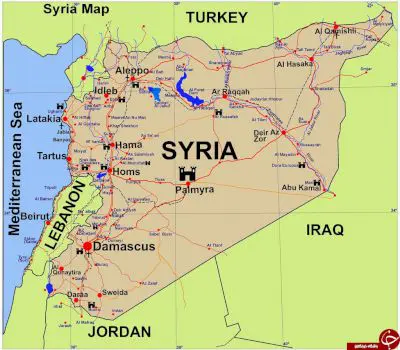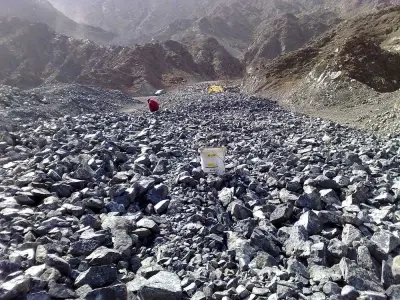Minerals Prices in Syria
Syria is located in West Asia, north of the Arabian Peninsula in the Middle East. Scientists have identified over 4000 minerals of the earth's crust. The Syrian government grants temporary imports of goods to other countries without paying taxes in the following cases. Substances that are formed based on natural processes are called minerals. Syria is a pristine export market for Iranian products due to the situation in Syria due to sanctions. Minerals can be identified by their physical properties, such as hardness, color, appearance (luster) and odor
Add your import and export orders to this list
Warning: Undefined variable $formTitle in /home/anbar/domains/anbar.asia/anbar/inc/html/desktop/orderform.php on line 10
Warning: Undefined variable $marketName in /home/anbar/domains/anbar.asia/anbar/inc/html/desktop/orderform.php on line 12
Warning: Undefined variable $location in /home/anbar/domains/anbar.asia/anbar/inc/html/desktop/orderform.php on line 12
If you want to trade in the , please join in Anbar Asia. Your order will be shown here, so the traders of contact you

Syria earns millions of dollars annually through its ports on the Mediterranean Sea. Some minerals can be detected by a little more features than the naked eye. The banking system in Syria is under the control of the Syrian government, and all Syrian banks operate under the Ministry of Economy and Trade. Providing quality material has a huge impact on your reputation as a trader
- Syria Coal Market
- Syria bauxite Market
- Syria Galena Market
- Syria Sphalerite Market
- Syria Chromite Market
- Syria Hematite Market
- Syria Cassitrite Market
- Syria Chalcopyrite Market

The Syrian economy is known as a state economy. The lack of strong financial resources and infrastructure in the private sector, as well as government interference in the economy, has put the country in a difficult economic situation.
Read More ...
Chromite is found as stone in nature. This stone is also known as chromite and contains chromium oxide with the formula FeCr2O4. Chromite occurs in mineral deposits and veins and may be found in the ground as small particles or larger deposits. Accumulations of chromite are found in some regions of the world including South Africa, Albania, Kazakhstan, Turkey and India.
Read More ...Syria and Algeria have the third largest phosphate reserves in the world. Since 2010, Syria has been expanding it phosphate reserves but the civil unrest in the country has greatly affected the level of production. Syria is part of the Middle East countries located between Turkey and Lebanon. Syria became an independent nation in 1946 and ever since was troubled by political instability and friction with Israel and Lebanon. The protests in the neighboring countries ignited the Syrians to engage in the same in 2011. The Syrian government used force to stop the but later tried to appease the people with some reforms. The global economic downturn, civil war, international sanctions, and low domestic consumption and production have slowed down Syria’s GDP growth. The natural resources of Syria include iron ore, crude oil, phosphate rock, manganese ore, asphalt, marble, rock salt, and gypsum. Syria accounted for about 2% of the world’s supply of phosphate rock in 2010. The map of Syria. Syria’s net imports of steel products amounted to 2. Syria’s cement production was about 10 million Mt/yr at the end of 2010. In 2010, General Organization for Cement and Building Materials operated eight state-owned cement plants in Syria, and produced more than 5 Mt of cement. Syria’s phosphate rock production amounted to about 3. In the same year, Syria struck a deal with India to start a joint-venture company aimed at developing phosphate rock production facilities. Syria’s total natural gas production in 2010 saw an increase of 37% to 7. , Abu Kamal Petroleum, and Syria-Sino Alkawkab Oil Co. By the end of 2010, it was estimated that Syria’s proved petroleum reserves amounted to about 2. Foreign companies operating in Syria are as follows:. Together these companies produced 180,000 bb/d while the state-owned Syrian Petroleum Co. According to reports, the mining sector of Syria is expected to continue producing phosphate rock and phosphate fertilizer production. However, this production may be hit due to the growing tensions between Syria and its neighbor, Turkey. 2010-sy. Syria: Mining, Minerals and Fuel Resources. "Syria: Mining, Minerals and Fuel "Syria: Mining, Minerals and Fuel Syria: Mining, Minerals and Fuel Resources.
Read More ...
Syria and Algeria have the third largest phosphate reserves in the world. Since 2010, Syria has been expanding it phosphate reserves but the civil unrest in the country has greatly affected the level of production. Syria is a country in the Middle East. The economy of Syria is very unstable due to the ongoing civil war. However, since the outbreak of the war, Syria has suffered massive economic sanctions restricting trade with the European Union, the Arab League, as well as several countries, especially in Europe and Asia. Despite the challenges it faces, Syria has several natural resources some of which have not been exploited. One of the major contributors to the Syrian economy is its energy. Along with natural gas reserves, Syria is home to crude oil fields. According to the IMF, before the civil war broke out in Syria, oil sales for 2010 was estimated to generate over $3. Syria is a relatively small oil producer, accounting for only 0. It is estimated that Syria’s proven oil reserve is about 2. Syria has a wealth of natural gas reserves, estimated to be holding 8. It is the most abundant natural resource in Syria. However, the Syrian Civil War has greatly affected production. In 2015, Syria produced only 4 million cubic meters, way below its capacity. Phosphate rocks are some of the major minerals exploited in Syria. According to recent estimates, Syria possesses extensive phosphate reserves which can amount to 1,700 million tons, of which the country estimates about 3. In 2009, Syria accounted for about 2% of the world’s phosphate rock output, ranking it the 9th largest phosphate rock producer in the world. The operation and mining of phosphate in Syria are supervised by the Ministry of Petroleum and Mineral Resources. Agriculture is one of the major priorities in Syria’s economic development plans, as the state seeks to be food Apart from sustained capital investment, development of better prices, and subsidies on input, Syria has large agricultural potential land. Of Syria’s total land area of 185,180 square kilometers, about 25. Apart from the above resources, Syria is also rich in several metallic and non-metallic mineral resources. The cement plants in Syria are operated by the General Organization for Cement and Building Material. The Syrian mining sector also produced minerals such as steel, salt, gypsum, chrome ore, manganese ore, marble, gypsum, and industrial salt. However, most of these minerals are produced in small quantities and do not contribute much to the economy.
Read More ...
https://www.azomining.com/Article.aspx?ArticleID=202
https://www.worldatlas.com/articles/countries-with-the-largest-phosphate-reserves.html

